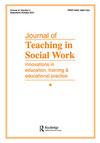翻转课堂技术在社会工作研究教学中的应用:有希望的结果
IF 0.8
Q3 EDUCATION & EDUCATIONAL RESEARCH
引用次数: 0
摘要
摘要理解和应用有效的研究方法在社会工作实践中是全国社会工作者协会和社会工作教育委员会的任务。虽然研究课程是确保学生掌握满足这些期望所需能力的基础,但学生往往会害怕这些课程。目前的研究是对使用翻转技术(FT)的干预措施的评估。按照英国《金融时报》文献中的教学模式,学生们被要求在上课前观看课程内容的视频,然后通过课堂练习应用材料。将接受干预的社会工作硕士研究班的学生与未接受干预的两个班的学生进行比较。干预的目标是提高学生1)对研究的兴趣,2)对研究在社会工作中的重要性的信念,3)毕业后参与研究的计划,以及4)研究知识。结果表明,除了对研究的兴趣(没有发现差异)外,干预组的学生在上述所有领域都比对照组做得更好。讨论了对社会工作教育的启示。本文章由计算机程序翻译,如有差异,请以英文原文为准。
The Use of Flipped Classroom Technology in Teaching Social Work Research: Promising Results
ABSTRACT Understanding and applying effective research methods in social work practice is a mandate from both the National Association of Social Workers and the Council of Social Work Education. While research courses are fundamental to ensure that students master the competency needed to meet these expectations, students frequently tend to dread them. The current study was an evaluation of an intervention that used flipped technology (FT). Following the pedagogical model present in the FT literature, students were required to watch videos on course content ahead of class sessions, which then were devoted to application of material via class exercises. Students in a Master’s of Social Work (MSW) research class that received the intervention were compared to those in two classes that did not receive the intervention. The goals of the intervention were to increase students’ 1) interest in research, 2) beliefs about the importance of research in social work, 3) plans to engage with research after graduation, and 4) research knowledge. The results demonstrated that students in the intervention group did better than the comparison group in all the areas above, except for interest in research (where no differences were found). Implications for social work education are discussed.
求助全文
通过发布文献求助,成功后即可免费获取论文全文。
去求助
来源期刊

Journal of Teaching in Social Work
EDUCATION & EDUCATIONAL RESEARCH-
CiteScore
1.20
自引率
0.00%
发文量
36
期刊介绍:
The Journal of Teaching in Social Work fills a long-standing gap in the social work literature by providing opportunities for creative and able teachers—in schools, agency-based training programs, and direct practice—to share with their colleagues what experience and systematic study has taught them about successful teaching. Through articles focusing on the teacher, the teaching process, and new contexts of teaching, the journal is an essential forum for teaching and learning processes and the factors affecting their quality. The journal recognizes that all social work practitioners who wish to teach (whatever their specialty) should know the philosophies of teaching and learning as well as educational methods and techniques.
 求助内容:
求助内容: 应助结果提醒方式:
应助结果提醒方式:


